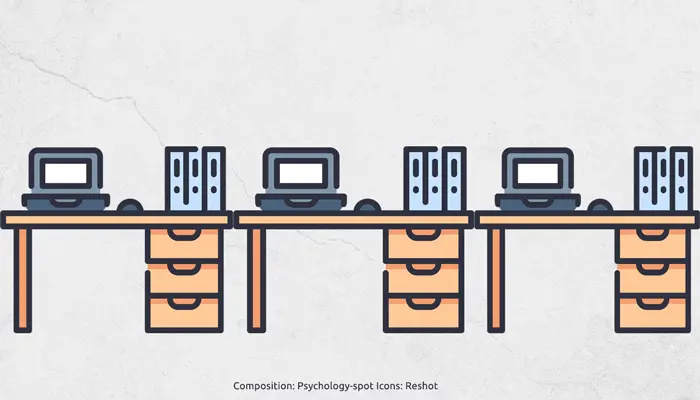
An apparently simple procedure becomes unspeakably long. One document generates the need to produce a thousand more. You go from one office to another. Ask. You get half answers. Time is ticking… Nobody takes responsibility. Empathy is conspicuous by its absence. Everyone follows orders, applies laws, follows protocols… They wash their hands. And meanwhile, your frustration grows. The feeling of helplessness overcomes you. Your mental balance suffers.
Bureaucracy, which seems to spread like a thousand-headed hydra through all levels and areas imaginable, has a considerable impact on our mental health and ends up shaping the response of the entire society, although it is not often talked about. In fact, it is a structural problem of the Modern Age that has accelerated over the last century and that not only contributes to the epidemic of mental disorders that we suffer today but also fuels growing social unrest.
Bureaucracy, the domain of Nobody where everyone’s responsibility is diluted
In the past, from Jean Bodin in 16th century France to Thomas Hobbes in 17th century England, not forgetting the Greek philosophers, everyone agreed that all forms of government are “The dominion of man over man”, either of a few, as in the case of monarchies and oligarchies, or of a larger group, as in aristocracies and democracies. However, philosopher Hannah Arendt added what she considered the last and most effective form of rule: bureaucracy.
“Bureaucracy is the domain of an office complex,” Arendt explained. In fact, the term itself comes from the French bureaucratie, composed of bureau which means “desk” and cratie, which comes from the Greek krátos and indicates “power” and “domination”. Therefore, bureaucracy implies transferring power to a complex network of desks where each person is nothing more than a cog unrelated to the next gear.
The peculiar thing about the bureaucratic system is that “Men cannot be held responsible, neither one nor the best, neither few nor many, so that it could be adequately defined as Nobody’s domain,” the philosopher explained.
In the past, we could “Identify tyranny as the Government that is not obliged to account for itself, but Nobody’s rule is clearly the most tyrannical of all, since there is precisely no one who can be asked what is being done”.
“It is that state of things, which makes it impossible to locate responsibility and identify the enemy,” according to Arendt. That is one of the main consequences of bureaucracy: its ability to dilute everyone’s responsibility, so that there are no “culprits” whom we can point to or ask for explanations.
We find ourselves immersed in a labyrinth of rules, laws, protocols, rituals and codes foreign to ourselves with no one who can guide us properly because each person we meet along the way washes their hands, transferring responsibility to the next level or blaming the previous employee or a ghostly “system.”
At the same time, this lack of responsibility prevents people from committing and identifying with their jobs, which leads to a state of constant alienation. This lack of meaning and connection with what we do every day will end up taking its toll on our mental health since it is the perfect breeding ground for chronic dissatisfaction. Therefore, it is not strange that we respond with anxiety and depression, precisely the two mental disorders that have grown the most in recent decades.
The long tentacles of bureaucracy
Arendt was convinced that the lack of responsibility generated by bureaucracy becomes “One of the most powerful causes of the current and rebellious unrest spread throughout the world, of its chaotic nature and its dangerous tendency to escape all control”, which can turn crazy.
Arendt, who was imprisoned in Nazi Germany and managed to escape to the United States, where she wrote about the utter lack of responsibility and conscience of bureaucrats who “merely” followed orders, believed that “The greater the bureaucratization of public life, the greater the attraction of violence will be,” precisely because no one feels responsible.
“In a fully developed bureaucracy, there is no one with whom to argue, to whom to present grievances, or on whom the pressures of power can be brought to bear. Bureaucracy is the form of Government in which everyone is deprived of political freedom and the power to act, where Nobody’s dominion is not the absence of dominion, but everyone is equally powerless, so it is about a tyranny without a tyrant.”
That is one of the reasons why one of the main demands of current social movements is freedom of expression and thought. As Max Weber pointed out, the universal advance of bureaucratic forms of social and political organization leaves no room for spontaneous, authentic and creative activity, which is why it endangers individual freedom.
When we feel that a mechanism lacking empathy engulfs us, that we cannot talk to anyone and that the rules and laws rather than protecting us limit us, it is normal for us to be victims of frustration, we settle into a state of learned helplessness and depression grows.
In other cases, the pressure exerted by bureaucracy manifests itself through anxiety and violence, which are nothing more than the attempt to recover that lost freedom. When we cannot find the culprits, we look for them in the figures that we find most unpleasant or threatening, according to the scapegoat theory, so it is not strange that we end up blaming those around us for our discomfort, thus creating a loop of negativity and discontent that ends up manifesting as a free-for-all just to discharge the deep feeling of helplessness generated by a system in which we feel trapped, bureaucracy.
Source:
Arendt, H. (2005) Sobre la violencia. Alianza Editorial: Madrid.



